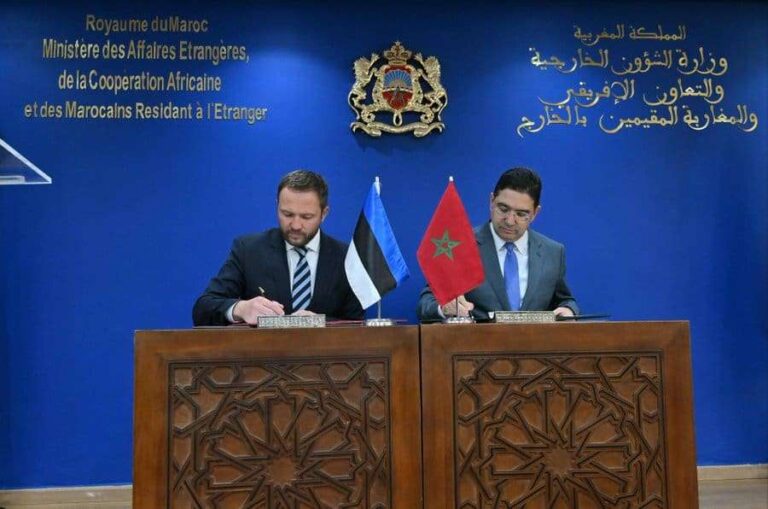After several countries, including Denmark and Finland, expressed their support for Morocco’s “serious and credible” initiative, Estonia has changed its position from general support for the UN political process to specific endorsement of the kingdom’s autonomy plan as a viable solution to the conflict.
Estonian Foreign Minister Margus Tsahkna today reiterated his country’s unwavering support for Morocco’s proposed autonomy plan for Western Sahara during his official visit to the North African country.
The visit, which celebrates more than 30 years of diplomatic relations between Estonia and Morocco, underscores Estonia’s commitment to becoming a leading strategic partner in the region, while strengthening its role in the European Union (EU) and the North Atlantic Treaty Organisation (NATO).
In a statement, Mr. Tsahkna said: “Estonia has taken the decision to support this autonomy plan, presented by Morocco in 2007 under the auspices of the United Nations and its Secretary-General.”
This support not only backs the recognition of Moroccan sovereignty over the enclave, but is also part of a broader strategy aimed at promoting stability in a region marked by geopolitical tensions.
The Estonian minister recalled the historical ties between the two nations, saying: “Morocco recognized Estonia shortly after we regained independence in 1991. Since then, our relations have developed in a pragmatic and close manner.”
Having regained its independence after decades of Soviet occupation, Estonia has used its digital expertise to strengthen its international relations.
“We are at the forefront of digitalization, and can boast of being a global reference in the digitalization of public services,” said Mr. Tsahkna. He added that Estonia’s experience in digital governance could greatly benefit Morocco, particularly in the management of its public resources and services, including in the sensitive context of
the Sahara.
Morocco’s recent strategy for 2030, which focuses on governance and development in several sectors, offers opportunities for cooperation with Estonia.
“We have agreed to work closely together, as we have a solid experience in reforms,” Tsahkna stressed, while specifying that Estonia is ready to share its digital governance solutions with Morocco. He also stressed the need to focus not only on technology, but also on developing transparency and trust in public services.
Morocco, due to its strategic position as a gateway to Africa, is seen by Estonia as a key partner.
“Morocco is a reliable ally and an essential gateway to Africa for European countries,” the Estonian
minister explained. The Estonian government believes that a stable relationship with Morocco could facilitate deeper economic partnerships, while opening up prospects for access to African markets, particularly in the context of the Sahara issue, which has long hampered foreign investment and regional stability.
The role of digital governance in this partnership cannot be underestimated. With 99 percent of its public services digitalised, Estonia aims to be a model to follow. Mr. Tsahkna mentioned the “X-Road” technical solution, capable of integrating multiple databases and likely to improve the delivery of public services in Morocco. The aim is to
adapt these tools to the specific needs of the kingdom, in order to foster a collaborative environment conducive to mutual growth.
The minister also highlighted the potential of economic partnerships between Estonian and Moroccan companies. “We are ready to develop tailor-made solutions to meet the needs of Morocco, and our companies are ready to invest in joint ventures,” he said. According to him, these collaborations could notably concern the sectors of technology, innovation and defense.
As the geopolitical situation in North Africa is changing, the strategic partnership between Estonia and Morocco is emerging as an opportunity to address regional challenges, particularly those related to the Sahara conflict.
“Morocco plays a leading role and is a trusted partner for the European Union,” Tsahkna said, stressing the
importance of the Kingdom in the EU’s growing diplomatic strategy in Africa.
At the same time, the minister called for strengthening cultural exchanges and cooperation in the field of education, hoping to see more Moroccan students join Estonian universities.
“Encouraging cultural exchanges will help create lasting relationships beyond political considerations,” he said.
Estonia’s support for Morocco’s autonomy plan comes within a major historical and strategic context.
This partnership marks an important milestone in bilateral relations between the two nations, seeking to combine innovation and cooperation to promote regional stability and economic development.
“Our relations go beyond politics; they aim to build trust and improve the quality of life of our citizens,” Mr. Tsahkna concluded.
RT/Sf/ac/fss/as/APA


